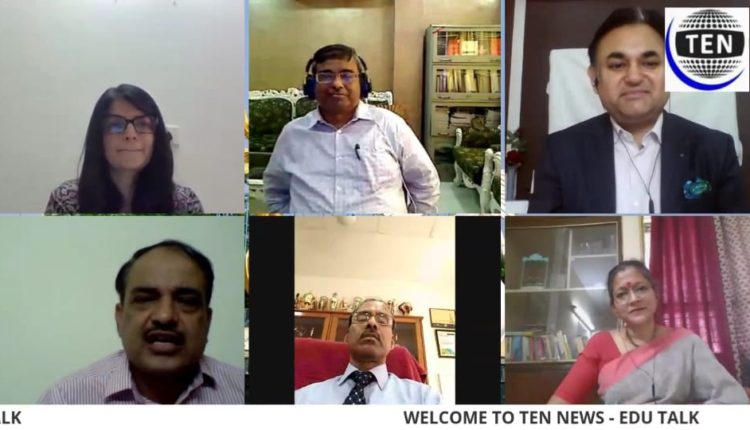In a webinar on Education and Assessment by Ten News, Prof. Sumita Vaid Dixit of Bennett University said that the Covid-19 will spell the death of rote learning. “Covid-19 is going to change how we evaluate, now it is not going to be based upon how well you memorize something, but it will be based upon whether you are able to acquire the skills which the course has set out to.”
On the role and responsibilities of teachers in this time of pandemic, Prof. Dixit said that teachers must ensure discipline in the class, they have to work in a way where every student gets to participate and doesn’t lose interest.
“We have to ensure active participation, students should be marked for class participation to ensure their participation.”
Prof. Dixit also talked about the increase in one one interaction with students in the lockdown period. “Students are more accessible and are opening up more with the teachers,” she said.
ITS Group’s executive director Prof. Dr. Vikas Singh said that students were alredy familiar with the technology and online platforms, most of them were alredy using the MOOC programs, so the change for them was swift and simple.
The challenge mainly lied with the faculty members but they have done well in adapting to technology.
On the feedback of parents, Dr. Singh said the parents are quite satisfied with online learning because earlier students were using mobile phones mostly for non productive activities, but now the screen time is being used for productive activities.
Prof. Sukanto from Department of Physics, Delhi University, said that the university admits 1 lakh regular students each year and it has students from more than 60 countries, so the challenge for them was immense.
The first big challenge was conducting the exams. Every college has a different format of completing their syllabus. So, the exam cannot be conducted till the syllabus has been completed in all the colleges.
The second challenge as per Prof. Sukanto is making the lecture relevant and vibrant for the students. “There is a vibrant environment and group enjoyment in the physical classrooms which is missing from the online lectures.”
Dr. Vinod K. Shanwal who coordinated the response to the pandemic in Gautam Buddha University said that the moment lockdown started, the university provided training to the teachers and simnountesily planned some soft skills programs for students like emotional well being, yoga and meditation.
“Our syllabus was alredy 70-75% completed even before lockdown, gradually the remaining syllabus was completed through online mode via zoom and other platforms.”
Dr. Shanwal said that the university regularly held meetings with the students and listened to the problems that they were facing in online classes.
“The university also requested the faculty members to provide recorded content and study material for students who were not able to access the online classes.”
On the end sem exams, Dr. Shanwal said that the end sem exams will be conducted only for the final year students.
On the future of next academic session, Dr. Shanwal said that the university has decided to extend the date of admissions and also to curtail the syllabus for the next academic session.
Dr. D. K. Sinha, Principal, Jagran Public School, Noida said that the lockdown was very challenging for the school in the beginning but the school alredy had a digital platform through which the teachers could send video lectures, assignments, results.
“The school also uploaded lectures on a youtube channel even before the live session was started.”
“The school also decided to restrict the live classes to 1 hour for senior students and to 30-40 minutes for lower classes to avoid any harm to the eyes of students.”
The webinar was moderated by Grads International School’s Principal Dr. Aditi Basu Roy who prepared the agenda for the webinar and efficiently managed and coordinated the responses.


